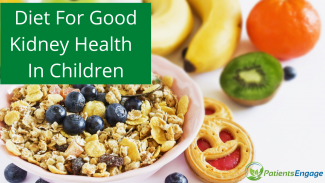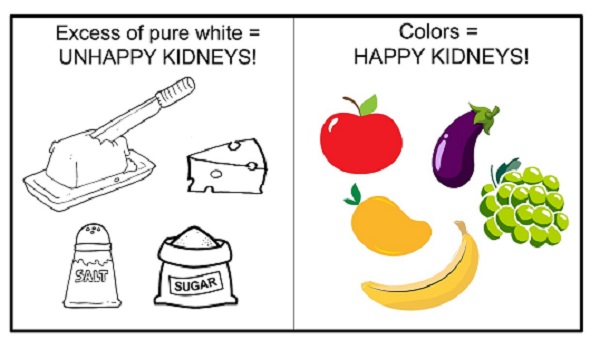
Dr. Pankaj Deshpande, Consultant Pediatric Nephrologist shares advice on dietary suggestions for good kidney health for all children What children should be drinking and what they should not? How much and when?
This is an important aspect of kidney health. A good balanced diet is required but many of us have forgotten what a balanced diet is!
1. Avoid a high salt intake
It not only causes fluid retention and increases the risk of hypertension (high blood pressure) but also may lead to more renal stones. Limited quantities of pickles, papad etc will reduce salt intake. Processed foods, junk food like burgers, pizza, sandwiches all increase the salt intake. Did you know that the daily bread/bun that we eat also has a fairly large amount of salt? Hence it does not spoil soon. Similarly, the much-touted morning breakfast cereals also have a lot of salt and sugar. Soups that are considered as healthy food are no longer healthy if made from packets because of the salt content. Freshly made soups at home are healthy. Noodles and the Chinese preparations also have a large amount of salt. In fact, we get our daily requirement of salt from the normal food that we take because of hidden salt content of most items. Therefore, adding extra salt to cooking or eating only increases the salt intake!
2. Avoid Too Much Sugar
In a similar way, too much sugar is also detrimental to general and finally kidney health. Increased calorie and sugar intake can lead to weight gain and that eventually leads to problems like hypertension and hyperfiltration (kidneys start leaking out more protein) that can be damaging to the kidneys. Being overweight or obese can thus be a direct morbidity factor for the kidneys. Just like salt, sugar content is hidden in daily items to such an extent that we are unaware of it. Daily breakfast cereals, bread, fizzy/carbonated drinks, canned fruit juices, obviously all desserts and sweetmeats made for festivals are all rich sources of sugar. Taking energy drinks after some minimal exercise is actually harmful and should be avoided.
3. Encourage Regular Intake Of Fruits and Vegetables
Fruits contain citrate that helps to prevent kidney stone formation. DASH diet is recommended for everyone (which has an intake of fruits and vegetables). More fibre is obviously helpful in increasing satiety levels as well as preventing constipation.
4. Exercise Daily
While exercise is not a food intake, it should be part of daily routine even in children to help keep weight under control and not tax the kidneys too much. ‘Chubby cheeks’ may be the parents desire but should not be the child’s goal as it may lead to problems later in life for the heart and kidneys.
5. Ensure Adequate Fluid Intake
In terms of fluids, adequate fluid intake is important for many reasons.
- Flushes the bladder and prevents urine infections
- Prevents constipation.
- Dehydrated children are often cranky and headache is quite common in children who do not drink enough fluids.
- It also helps in weight control
- Prevents kidney stones.
The figures given below give a general idea of the quantity of fluids that is required in children.
|
Weight |
Amount of fluid intake recommended in 24 bours |
|
Around 10 kg |
At least a litre of fluids |
|
15 kg |
1.25 litres |
|
20 kg |
Usually resolves in a week. Ask your doctor about dose reduction. |
|
30 kg |
1.8 litres |
This includes milk, water, fruit juices, water in cooked food etc. In the presence of problems like kidney stones or constipation, this intake has to be drastically increased. Plain water is the best fluid. Fruit juices (prepared at home) are also good. The child should be finishing the intake of fluids before 8 pm. Invariably children forget to drink in the day and are forced to drink a large quantity of fluids in the evening before bed due to thirst and those with a tendency to bedwetting will end up wetting the bed, not to mention being irritable and cranky in the day!
As mentioned above certain drinks are known to cause an irritable bladder and should be avoided. Tea/coffee should be avoided in children less than 12 years of age. Similarly, carbonated or fizzy drinks also stimulate the bladder and should be kept to a minimum. Sports drinks with a lot of sugar also cause the same effect. Certain brands of milk are being advertised to be taken for weight gain. They contain nearly double the calorie content of regular milk and are not meant for normal children. They are meant for premature babies to gain weight, not for normal children to gain weight! They can cause various problems like excess calcium in the urine or an irritable bladder.
Let us all pledge to do all the simple things required to keep our kidneys happy as they work tirelessly throughout the day and night without having the glamour quotient of the heart!
Figure : Keeping kidneys happy with diet

To know more about kidney issues in children. click on the links below
Part 1 – Kidney Stones
Part 2 – Urinary Bladder Issues

Dr Pankaj V Deshpande, MD Pediatrics, MRCP (UK), DCH, FCPS
Consultant Pediatric Nephrologist attached to Hinduja Hospital, Mahim; Apollo hospital, Belapur; Hinduja Health care, Khar; MGM hospital Vashi
MD from Bai Jerbai Wadia hospital/KEM hospital. MRCP, UK with specialization in Pediatric Nephrology. Practiced in Birmingham Childrens Hospital, Guy’s hospital, and Southampton General Hospital, .






